Why you should attend
Many statistical softwares are now available to professionals. However, these softwares were developed for statisticians and can often be daunting to non-statisticians. How do you know if you are pressing the right key, let alone performing the best test?This seminar provides a non-mathematical introduction to biostatistics and is designed for non-statisticians. And it will benefit professionals who must understand and work with study design and interpretation of findings in a clinical or biotechnology setting.
The focus of the seminar is to give you the information and skills necessary to understand statistical concepts and findings as applies to clinical research, and to confidently convey the information to others.
Emphasis will be placed on the actual statistical (a) concepts, (b) application, and (c) interpretation, and not on mathematical formulas or actual data analysis. A basic understanding of statistics is desired, but not necessary.
Agenda
Lecture 1 (45 Mins) -Why Statistics?- Do we really need statistical tests?
- Sample vs. Population
- I'm a statistician not a magician! What statistics can and can't do
- Descriptive statistics and measures of variability
- Confidence intervals
- p-values
- effect sizes
- Clinical vs. meaningful significance
- Comparative tests
- Regression analysis
- Non-parametric techniques
- A different way of thinking
- Bayesian methods and statistical significance
- Bayesian applications to diagnostics testing
- Bayesian applications to genetics
Team Exercise: Review a scientific paper and learn how to
- Interpret statistical jargon
- Look for reproducibility, transparency, bias, and limitations
- Convey information coherently to non-statisticians
- Review of p-value, significance level, effect size
- Formulas, software, and other resources for computing a sample size
- Using FDA guidance as a foundation, learn the steps and criteria needed to develop a statistical analysis plan (SAP)
- An SAP template will be given to all attendees
- Comparing Survival Curves
- Pharmocokinetics/Pharmacodynamics (PK/PD)
- Taking a holistic view to study design and interpretation
- Question and Answer session
Speaker
Elaine Eisenbeisz is a private practice statistician and owner of Omega Statistics, a statistical consulting firm based in Southern California. Elaine has over 30 years of experience in creating data and information solutions for industries ranging from governmental agencies and corporations, to start-up companies and individual researchers.Who Should Attend
- Physicians
- Clinical Research Associates
- Clinical Project Managers/Leaders
- Sponsors
- Regulatory Professionals who use statistical concepts/terminology in reporting
- Medical Writers who need to interpret statistical reports








